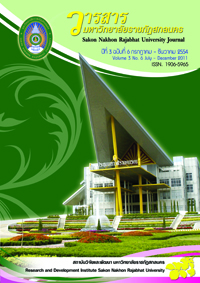รูปแบบการพัฒนาประสิทธิผลการบริหารงานวิชาการ ในโรงเรียนขนาดเล็กสังกัดสำนักงานคณะกรรมการการศึกษาขั้นพื้นฐาน
Abstract
บทคัดย่อ
การวิจัยครั้งนี้มีวัตถุประสงค์เพื่อศึกษาปัจจัยที่ส่งผลต่อประสิทธิผลการบริหารงานวิชาการในโรงเรียน ขนาดเล็ก และเพื่อแสวงหารูปแบบการพัฒนาประสิทธิผลการบริหารงานวิชาการในโรงเรียนขนาดเล็ก โดยวิธีการ วิจัยแบบพหุวิธี (Multiple Methodologies)ได้แก่ การวิเคราะห์เอกสารและงานวิจัย การสัมภาษณ์ผู้ทรงคุณวุฒิ วิธีการวิจัยเชิงสำรวจ การใช้เทคนิค EDFR จำนวน 2 รอบ และการใช้เทคนิคการสนทนากลุ่ม กลุ่มเป้าหมายของ การวิจัยครั้งนี้ ประกอบด้วย ผู้ทรงคุณวุฒิที่ให้สัมภาษณ์จำนวน 8 คน ผู้ทรงคุณวุฒิที่ใช้เทคนิค EDFR จำนวน 12 คน และผู้เชี่ยวชาญที่ใช้เทคนิคการสนทนากลุ่ม จำนวน 14 คนเลือกแบบเจาะจงรวมทั้งสิ้น 34 คน กลุ่มตัวอย่าง ประกอบด้วยผู้บริหารโรงเรียนและครูวิชาการโรงเรียนในโรงเรียนขนาดเล็ก สังกัดเขตพื้นที่การศึกษาในจังหวัด สกลนคร ปีการศึกษา 2553 จำนวน 327 คนได้มาโดยการสุ่มหลายขั้นตอน เครื่องมือที่ใช้ในการเก็บรวบรวม ข้อมูลได้แก่ แบบสัมภาษณ์แบบมีโครงสร้าง แบบสอบถามชนิดมาตราส่วนประมาณค่าและแบบตรวจสอบรายการ สถิติที่ใช้ในการวิเคราะห์ข้อมูล ได้แก่ ความถี่ ร้อยละ ค่าเฉลี่ย ส่วนเบี่ยงเบนมาตรฐาน มัธยฐาน ค่าพิสัยระหว่าง ควอไทล์ ค่าสหสัมพันธ์ ค่าสมการถดถอยพหุคูณ และค่าเอฟ
ผลการวิจัยพบว่า
1. ปัจจัยที่ส่งผลต่อประสิทธิผลการบริหารงานวิชาการในโรงเรียนขนาดเล็ก มีกลุ่มตัวแปรในแต่ละ ปัจจัย 8 ตัวแปร ประกอบด้วย (1) ความเข้าใจเกี่ยวนโยบายและมาตรฐานของผู้บริหารและครู (2) ทรัพยากร เทคโนโลยีและสิ่งอำนวยความสะดวกที่ส่งเสริมงานวิชาการ (3) ส่งเสริมการยกระดับคุณภาพการบริหารหลักสูตร และการจัดการเรียนการสอน (4) การใช้หลักธรรมาภิบาลในการบริหารงานวิชาการในโรงเรียน (5) การส่งเสริม ปัจจัยจูงใจในการทำงานของผู้บริหารและครู (6) การส่งเสริมให้มีการทำวิจัยในชั้นเรียนอย่างต่อเนื่อง (7) การส่งเสริมให้ผู้บริหารและครูมีการจัดการเกี่ยวกับการใช้เวลาในการเรียนรู้ทางวิชาการและ (8) การสนับสนุนให้ ชุมชนมีส่วนร่วมในการจัดการเรียนการสอนของครู ซึ่งในการวิจัยนี้กำหนดให้กลุ่มตัวแปรดังกล่าว เป็น“กลุ่มตัว แปรกระบวนการขับเคลื่อนการดำเนินงานวิชาการในโรงเรียนขนาดเล็ก”
2. รูปแบบการพัฒนาประสิทธิผลการบริหารงานวิชาการในโรงเรียนขนาดเล็กโดยภาพรวมและราย ด้านผู้ทรงคุณวุฒิและผู้เชี่ยวชาญมีความคิดเห็นยอมรับวิธีการพัฒนา ร้อยละ 80 ขึ้นไป และวิธีการพัฒนามีความ เหมาะสมระดับมากถึงมากที่สุด และพบว่าวิธีการพัฒนาที่ใช้มี 2 ลักษณะ 9 วิธี ประกอบด้วย (1) วิธีการพัฒนา เป็นรายบุคคล วิธีที่ใช้มีการศึกษาที่บ้าน (การศึกษาด้วยตนเอง) และ การฝึกปฏิบัติงาน (2) วิธีการพัฒนาเป็นราย กลุ่ม วิธีที่ใช้มีการประชุม การอภิปราย การอบรม การศึกษารายกรณี การศึกษาดูงาน การสาธิตและกิจกรรม นันทนาการ
การนำรูปแบบการพัฒนาประสิทธิผลการบริหารงานวิชาการในโรงเรียนขนาดเล็กดังกล่าวไปใช้นั้น ควรใช้กระบวนการขับเคลื่อนซึ่งเป็นกิจกรรมหรือการดำเนินงานแต่ละประเภทให้เหมาะสม การดำเนินงานทาง วิชาการทั้งภาพรวมและรายด้านควรใช้วิธีการพัฒนาอย่างใดอย่างหนึ่งหรือมากกว่า และมีกระบวนการ PDCA เป็นพื้นฐานหลักอย่างต่อเนื่อง
Abstract
This research aimed at investigating factors impacting the effectiveness development management of academic affairs in small schools and searching for models of effectiveness development management on academic affairs in small schools . Multiple Methodologies were applied through reviews of literature, interviews of scholars, survey researches, two-cycle EDFR and group-discussion technique. The target group consisted of 8 interviewed scholars,12 scholars on EDFR and 14 experts on group-discussion technique-a total of 34 participants using Purposive Random Sampling. Subjects were composed of 327 school administrators and teachers in charge of academic affairs in small schools under the Offices of Sakon Nakhon Educational Services Area in academic year 2010 through Multistage Random Sampling. Instruments employed to collect data comprised structured interviews, a set of rating scale questionnaires and check list. Statistics used were frequency, percentage, standard deviation, median, inter quartile rank(IQR), correlation, multiple regression analysis and F-test.
Findings of this study were as follows:
1. The factors affecting the academic affairs management in the small schools comprised each group of variables in each factor among 8 variables: (1) understanding of policies and standards among the school administrators and teachers, (2) resources, technologies and facilities supporting academic affairs, (3) promotion of curriculum and instruction management, (4) good governance application in school academic affairs management, (5) performance enhancement of stimulus factors among the school administrators and teachers, (6) promotion of the continuity on classroom research, (7) enhancement of time spent on academic affairs of the school administrators and teachers, and (8) support for community cooperation regarding the teachers" instructional management. These variables were considered as " variables on the drive of academic affairs in small schools."
2. The model of effectiveness development management on academic affairs in the small schools, in general and in particular, as perceived by the scholars and experts were higher than 80 per cent.The methods on development were considered appropriate from the high to highest levels. It was also found that there were development methods of 2 characteristics with 9 ways: (1) individual development method - self-study (home study), and practices, (2) group-development method - meetings, discussions, trainings, case studies, study tours, demonstrations and recreational activities.
The application of academic affairs management development in the said small schools should be employed in forms of drive procedure in accordance with each activity. The performance of academic affairs, as a whole and in each aspect, was applied through a development method or more along with a PDCA procedure as a continual fundamental aspect.









